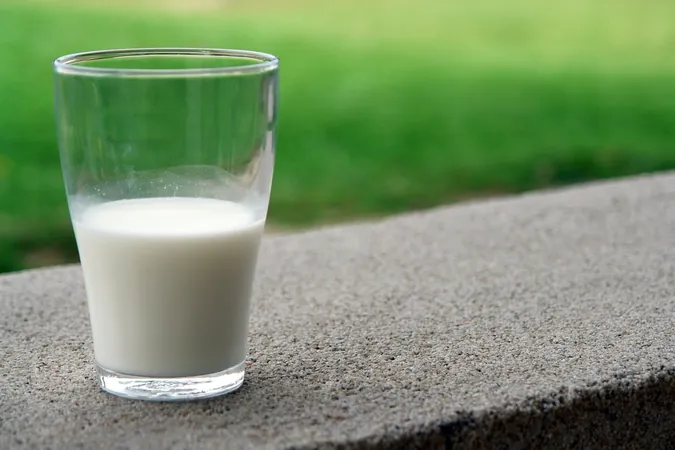
California's Raw Milk Sales Halted Amid Bird Flu Scare: What You Need to Know!
2024-12-05
Author: Amelia
California's Raw Milk Sales Halted Amid Bird Flu Scare
In a shocking move that has sent ripples through the dairy community, California health officials have ordered an immediate halt on all raw milk and cream sales from a Fresno-based dairy farm due to concerns of H5N1 bird flu virus contamination. The California Department of Public Health (CDPH) has urged consumers to return any purchased products to stores immediately.
"Californians are strongly discouraged from consuming any raw milk or cream products," stated the CDPH in a press release on Monday night. They emphasized that pasteurized milk, which successfully kills off viruses and other pathogens, remains safe for consumption.
The ongoing investigation revealed serious contamination issues, with samples of raw milk from Raw Farm, the state's leading raw milk producer, testing positive for bird flu. This outbreak has prompted a much broader recall than the limited one initiated last week, which was confined to specific product lots in Santa Clara County. Details regarding the affected retail stores remain undisclosed due to health protocol restrictions.
The CEO of Raw Farm, Mark McAfee, described the recall as a politicized issue rather than a food safety dilemma. He assured consumers through the company's website, stating, "There are no food safety issues with our products," while emphasizing the farm's commitment to collaborating with regulatory agencies during this tumultuous time.
Despite no reported cases of human infection linked directly to Raw Farm's products, health experts warn that ingesting or inhaling raw milk infected with bird flu can lead to serious health consequences. According to the CDPH, exposure can occur through contaminated surfaces or even by touching one’s face after handling the dairy products. Research has shown that the virus can remain active in refrigerated raw milk for several weeks, heightening the risk of transmission.
The implications extend beyond just human health; some cats fed infected raw milk have succumbed to the virus, showcasing its lethal potential in animal populations. The Centers for Disease Control and Prevention (CDC) has documented systemic infections resulting from these cases, raising concerns about the overall impact of the outbreak on local ecosystems.
As the investigation continues, the severity of the situation remains clear. The containment measures in place have left Raw Farm essentially quarantined, unable to sell any of its raw products or move cattle off its premises for over two months. McAfee is permitted to sell milk to pasteurizers, but this represents a dramatic shift in operations for his 1,800-cow dairy.
Virologists have expressed concerns over the potential for the H5N1 virus to evolve, noting that it is just "a mutation or two away" from being able to infect humans directly. With H5N1 cases having recently infected a staggering 493 of California's 1,100 dairy operators, observers are anxiously watching to see if more serious outbreaks will emerge.
California's laws permit the sale of raw milk, a controversial topic given its history of contamination with other pathogens like Salmonella and E. coli. Recent litigation linked to a Salmonella outbreak implicated multiple counties, showcasing the persistent dangers associated with raw dairy products.
As of now, California has chosen to utilize advertising restrictions and warning labels rather than blanket bans on raw milk sales. This approach reflects ongoing debates about consumer rights and food safety in the rapidly evolving world of food regulations.
Stay informed, stay safe, and if you have raw milk in your fridge, don't hesitate to return it to your local store!



 Brasil (PT)
Brasil (PT)
 Canada (EN)
Canada (EN)
 Chile (ES)
Chile (ES)
 Česko (CS)
Česko (CS)
 대한민국 (KO)
대한민국 (KO)
 España (ES)
España (ES)
 France (FR)
France (FR)
 Hong Kong (EN)
Hong Kong (EN)
 Italia (IT)
Italia (IT)
 日本 (JA)
日本 (JA)
 Magyarország (HU)
Magyarország (HU)
 Norge (NO)
Norge (NO)
 Polska (PL)
Polska (PL)
 Schweiz (DE)
Schweiz (DE)
 Singapore (EN)
Singapore (EN)
 Sverige (SV)
Sverige (SV)
 Suomi (FI)
Suomi (FI)
 Türkiye (TR)
Türkiye (TR)
 الإمارات العربية المتحدة (AR)
الإمارات العربية المتحدة (AR)